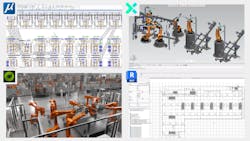BMW Group's Virtual Factory Construction System Rolling Out Worldwide
BMW Group plans to use Nvidia's Omniverse system globally, allowing plant engineers worldwide to collaborate in virtual spaces and design and run new plants years before construction actually begins.
'Digital twin' technology usually refers to virtual copies of working plants. Sensors installed across the facility (a.k.a. a 'digital thread') provide a constant feed of fresh data to update the twin. Rather than referring to multiple, different systems to check on machine health, switchover progress or other specific, daily operations, manufacturers refer to the digital twin for a holistic view that hooks into every system simultaneously.
Nvidia Omniverse is like a digital twin for a factory that hasn't been built yet, to inform construction plans. Rather than drawing data from real world sources, the software uses AI to simulate the physical operation of a plant. As part of its announcement on Tuesday at Nvidia's GTC conference, BMW Group announced that it currently uses the Omniverse system to run a virtual twin of its upcoming EV plant in Debrecen, Hungary, that doesn't actually begin production until 2025.
BMW and Nvidia tested and jointly industrialized the Omniverse system for almost two years prior to this week's announcement. BMW had to develop tools and processes to integrate Omniverse into its IT environment, for instance a methodology for converting data from source systems into the Omniverse platform, gathering 3D data on floor tools to create accurate, virtual copies and developing custom applications for non 3D-experts to create and maintain the virtual factories.
"Simulations aren’t generated in Omniverse but visualized – based on industry software which we’ve been using for decades," says Janne Strauss-Ehrl, subproduct owner for 3D realtime applications at BMW Group.
Nvidia had to enhance its Omniverse software to accomodate BMW's needs, like improving large scale factory simulation quality, user interfaces and tools for taking measurements, among other changes.
"The work of our mutual partner Ipolog on their Omniverse applications for factory material flow optimization with AI is a great example," says Mike Geyer, Omniverse Product Management for Manufacturing and Digital Twins at NVIDIA.
"The main purpose of Omniverse is to enable improvements even before the hardware is realized. Omniverse is also a means of identifying planning mistakes that prior were only detected during the realization phase. There were already situations where the visualization of robot arm movements in the virtual world prevented the potential destruction of a catwalk in real life," Strauss-Ehrl says.
About the Author
Dennis Scimeca
Dennis Scimeca is a veteran technology journalist with particular experience in vision system technology, machine learning/artificial intelligence, and augmented/mixed/virtual reality (XR), with bylines in consumer, developer, and B2B outlets.
At IndustryWeek, he covers the competitive advantages gained by manufacturers that deploy proven technologies. If you would like to share your story with IndustryWeek, please contact Dennis at [email protected].


